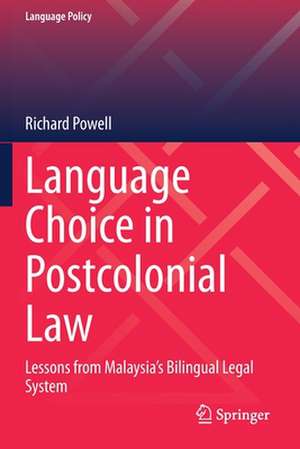Language Choice in Postcolonial Law: Lessons from Malaysia’s Bilingual Legal System: Language Policy, cartea 22
Autor Richard Powellen Limba Engleză Paperback – 25 feb 2021
| Toate formatele și edițiile | Preț | Express |
|---|---|---|
| Paperback (1) | 389.70 lei 6-8 săpt. | |
| Springer Nature Singapore – 25 feb 2021 | 389.70 lei 6-8 săpt. | |
| Hardback (1) | 397.16 lei 6-8 săpt. | |
| Springer Nature Singapore – 25 feb 2020 | 397.16 lei 6-8 săpt. |
Din seria Language Policy
- 24%
 Preț: 804.41 lei
Preț: 804.41 lei - 18%
 Preț: 885.63 lei
Preț: 885.63 lei - 18%
 Preț: 1009.08 lei
Preț: 1009.08 lei - 24%
 Preț: 776.31 lei
Preț: 776.31 lei - 18%
 Preț: 775.30 lei
Preț: 775.30 lei - 15%
 Preț: 641.71 lei
Preț: 641.71 lei - 15%
 Preț: 634.32 lei
Preț: 634.32 lei - 18%
 Preț: 740.25 lei
Preț: 740.25 lei - 15%
 Preț: 643.16 lei
Preț: 643.16 lei - 15%
 Preț: 642.68 lei
Preț: 642.68 lei - 18%
 Preț: 1118.75 lei
Preț: 1118.75 lei - 24%
 Preț: 753.11 lei
Preț: 753.11 lei - 15%
 Preț: 647.40 lei
Preț: 647.40 lei - 18%
 Preț: 785.42 lei
Preț: 785.42 lei - 18%
 Preț: 949.23 lei
Preț: 949.23 lei - 18%
 Preț: 895.58 lei
Preț: 895.58 lei - 15%
 Preț: 645.47 lei
Preț: 645.47 lei - 24%
 Preț: 689.39 lei
Preț: 689.39 lei - 15%
 Preț: 642.83 lei
Preț: 642.83 lei - 15%
 Preț: 648.89 lei
Preț: 648.89 lei - 15%
 Preț: 635.80 lei
Preț: 635.80 lei - 15%
 Preț: 634.32 lei
Preț: 634.32 lei - 18%
 Preț: 1106.79 lei
Preț: 1106.79 lei - 24%
 Preț: 787.79 lei
Preț: 787.79 lei - 18%
 Preț: 1111.97 lei
Preț: 1111.97 lei - 24%
 Preț: 738.97 lei
Preț: 738.97 lei - 15%
 Preț: 700.29 lei
Preț: 700.29 lei - 18%
 Preț: 895.27 lei
Preț: 895.27 lei - 18%
 Preț: 889.60 lei
Preț: 889.60 lei - 18%
 Preț: 953.97 lei
Preț: 953.97 lei
Preț: 389.70 lei
Nou
Puncte Express: 585
Preț estimativ în valută:
74.58€ • 77.57$ • 61.57£
74.58€ • 77.57$ • 61.57£
Carte tipărită la comandă
Livrare economică 14-28 aprilie
Preluare comenzi: 021 569.72.76
Specificații
ISBN-13: 9789811511752
ISBN-10: 9811511756
Pagini: 300
Ilustrații: XXI, 300 p. 22 illus.
Dimensiuni: 155 x 235 mm
Greutate: 0.45 kg
Ediția:1st ed. 2020
Editura: Springer Nature Singapore
Colecția Springer
Seria Language Policy
Locul publicării:Singapore, Singapore
ISBN-10: 9811511756
Pagini: 300
Ilustrații: XXI, 300 p. 22 illus.
Dimensiuni: 155 x 235 mm
Greutate: 0.45 kg
Ediția:1st ed. 2020
Editura: Springer Nature Singapore
Colecția Springer
Seria Language Policy
Locul publicării:Singapore, Singapore
Cuprins
1 Conceptualising and contextualising Malaysian bilingual law.- 2 Political and economic influences on multilingualism and multijuralism.- 3 Status planning in Malaysian law.- 4 Corpus Planning.- 5 Acquisition Planning.- 6 Discourse Planning.- 7 Language practices in legal education.- 8 Bilingualism in Law Offices.- 9 Bilingual courtrooms.- 10 Common Law and vernacularisation: A global perspective.- 11 Malaysia bilingualism as a model for postcolonial law.
Notă biografică
Richard POWELL is a Professor (English/International Course/Language & Human Rights) in the Department of Economics at Nihon University, Japan. His research interests include forensic linguistics, legal English, language planning and cross-cultural pragmatics and he conducts research in East Africa, South Asia, East Asia, and Southeast Asia. Coming to the field of language and law from a background in history (Cambridge), politics (SOAS, London), law (College of Law, London) and applied linguistics (Macquarie, Sydney), he holds a PhD in Sociolinguistics and Legal Education from Melbourne University. He is particularly interested in the macro-level decisions that influence conscious and subconscious individual choices in law and education. He is on the board of directors of Japan's Law and Language Association and sits on the advisory committee of a number of publications, including the International Journal of the Semiotics of Law and Law and Visual Jurisprudence. He is the book reviews editor of the International Journal of Speech, Language and the Law.
Textul de pe ultima copertă
This book discusses multilingual postcolonial common law, focusing on Malaysia’s efforts to shift the language of law from English to Malay, and weighing the pros and cons of planned language shift as a solution to language-based disadvantage before the law in jurisdictions where the majority of citizens lack proficiency in the traditional legal medium. Through analysis of legislation and policy documents, interviews with lawyers, law students and law lecturers, and observations of court proceedings and law lectures, the book reflects on what is entailed in changing the language of the law. It reviews the implications of societal bilingualism for postcolonial justice systems, and raises an important question for language planners to consider: if the language of the law is changed, what else about the law changes?
Caracteristici
Addresses the widespread but under-researched problem of language-based disadvantage in polities whose law is administered in an elite medium that most citizens lack proficiency in Applies language-planning, analytical tools more usually targeted at educational systems than at the legal domain Presents an in-depth case study of a single jurisdiction while inviting comparisons with other postcolonial legal systems Draws on data from questionnaires and focus groups with 500 law students, interviews with 60 lawyers, and nationwide observations of courtroom hearings and law lectures
